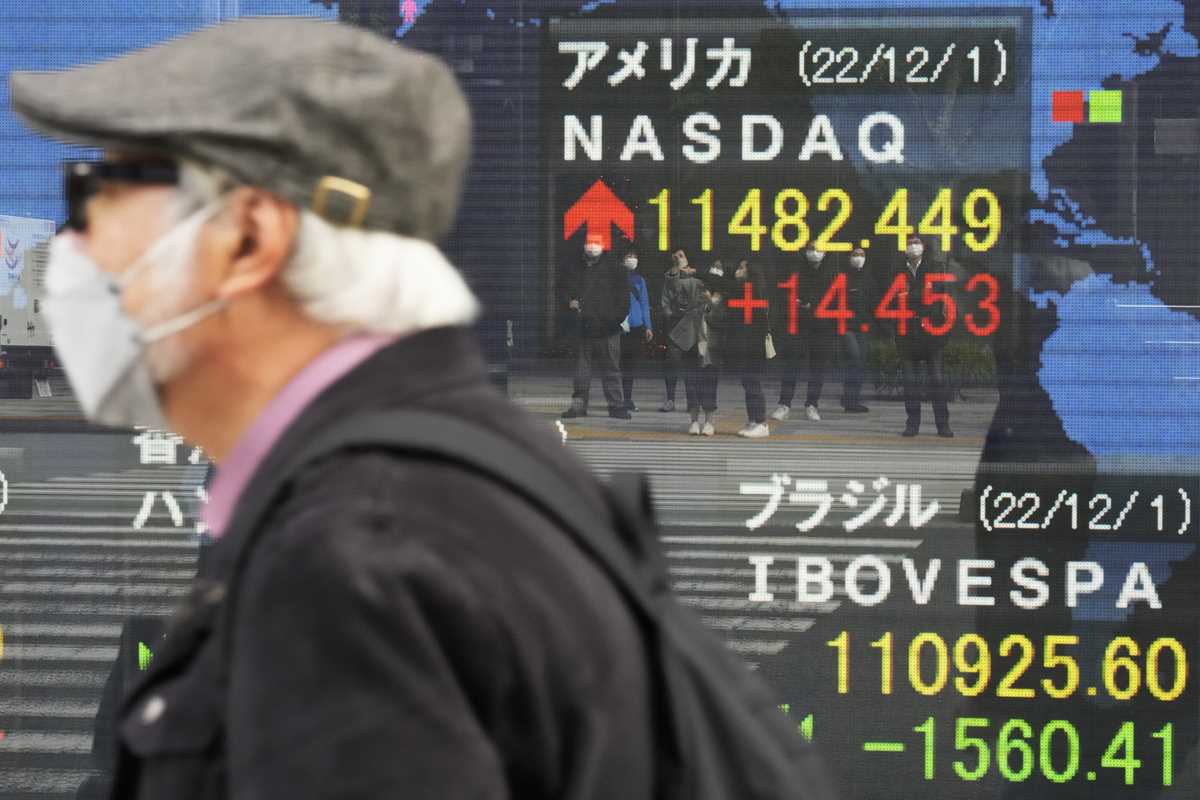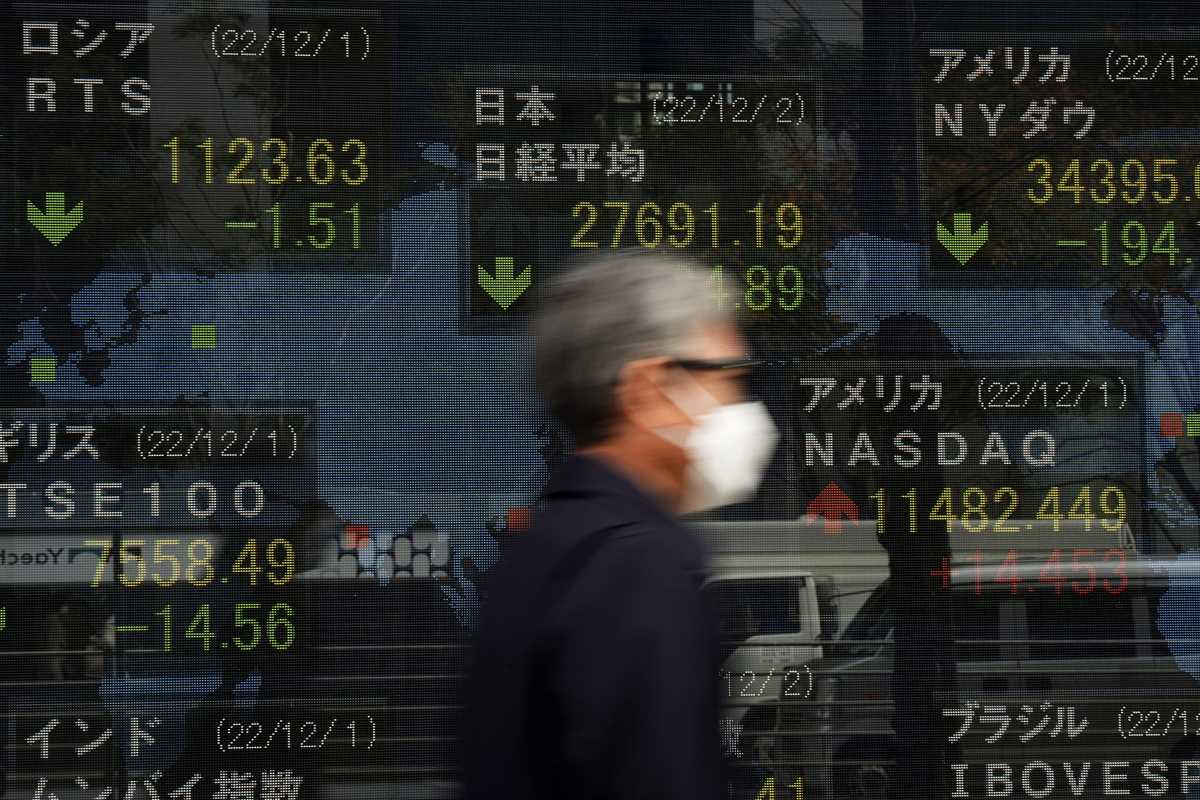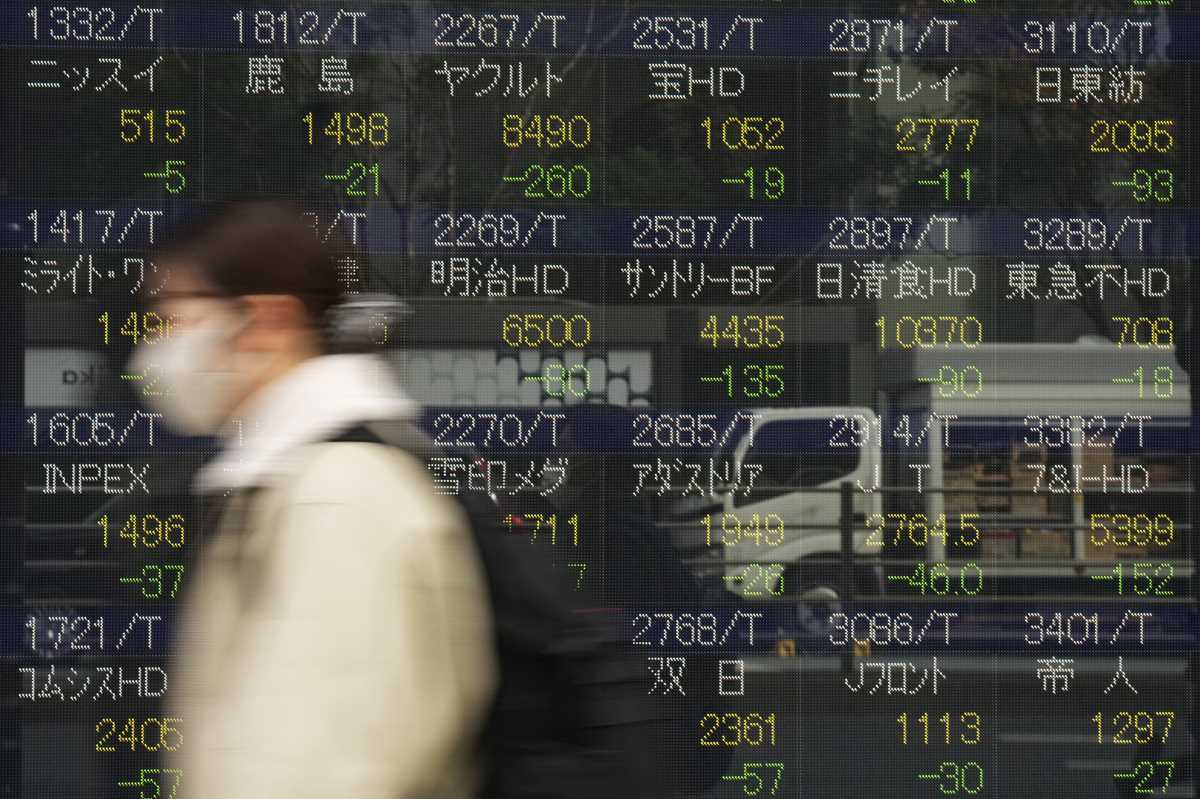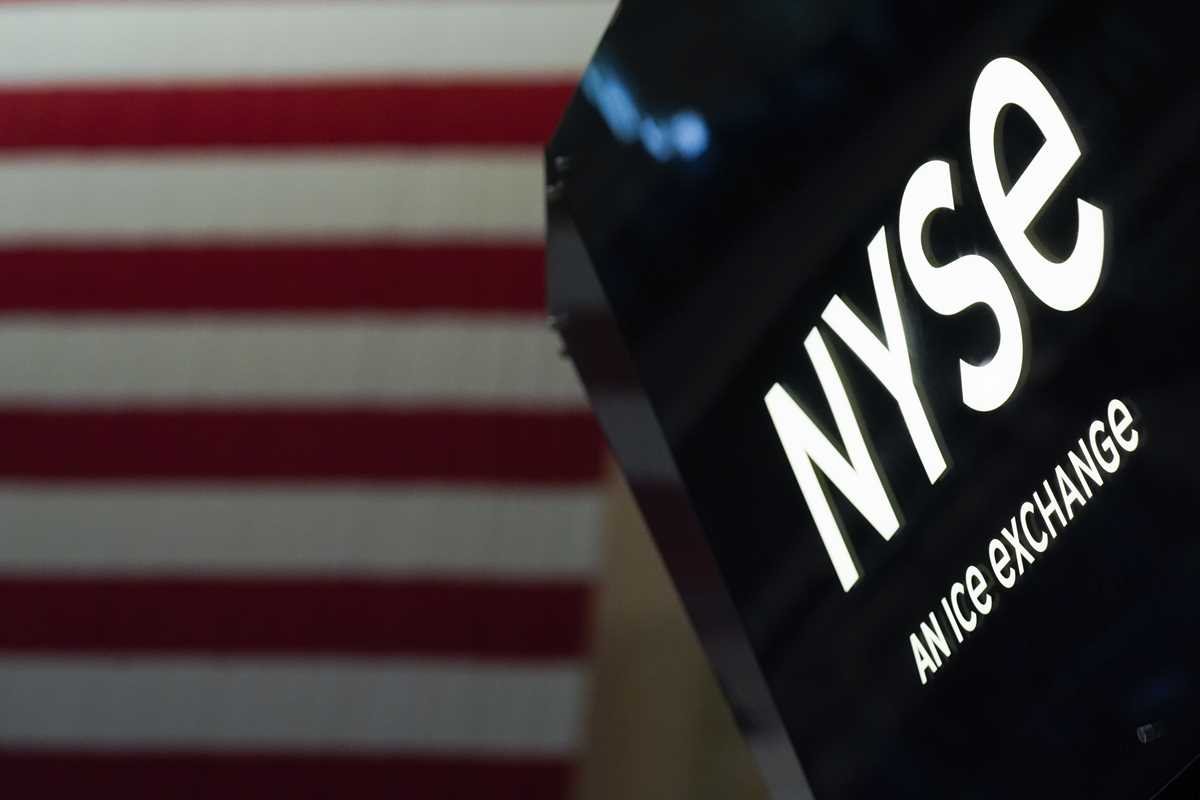 Pedestrians are seen reflected on monitors showing the U.S. NASDAQ and other countries' stock market indexes at a securities firm in Tokyo, Friday, Dec. 2, 2022. Shares retreated in Asia on Friday after a mixed day on Wall Street as optimism over signs the Federal Reserve may temper its aggressive interest rate hikes was replaced by worries the economy might be headed for a recession. (AP Photo/Hiro Komae)
Pedestrians are seen reflected on monitors showing the U.S. NASDAQ and other countries' stock market indexes at a securities firm in Tokyo, Friday, Dec. 2, 2022. Shares retreated in Asia on Friday after a mixed day on Wall Street as optimism over signs the Federal Reserve may temper its aggressive interest rate hikes was replaced by worries the economy might be headed for a recession. (AP Photo/Hiro Komae) A man walks by monitors showing Japan's Nikkei 225 index and other countries' stock market indexes at a securities firm in Tokyo, Friday, Dec. 2, 2022. Shares retreated in Asia on Friday after a mixed day on Wall Street as optimism over signs the Federal Reserve may temper its aggressive interest rate hikes was replaced by worries the economy might be headed for a recession. (AP Photo/Hiro Komae)
A man walks by monitors showing Japan's Nikkei 225 index and other countries' stock market indexes at a securities firm in Tokyo, Friday, Dec. 2, 2022. Shares retreated in Asia on Friday after a mixed day on Wall Street as optimism over signs the Federal Reserve may temper its aggressive interest rate hikes was replaced by worries the economy might be headed for a recession. (AP Photo/Hiro Komae) A woman walks by monitors showing Japanese companies' stock market prices at a securities firm in Tokyo, Friday, Dec. 2, 2022. Shares retreated in Asia on Friday after a mixed day on Wall Street as optimism over signs the Federal Reserve may temper its aggressive interest rate hikes was replaced by worries the economy might be headed for a recession. (AP Photo/Hiro Komae)
A woman walks by monitors showing Japanese companies' stock market prices at a securities firm in Tokyo, Friday, Dec. 2, 2022. Shares retreated in Asia on Friday after a mixed day on Wall Street as optimism over signs the Federal Reserve may temper its aggressive interest rate hikes was replaced by worries the economy might be headed for a recession. (AP Photo/Hiro Komae) An NYSE sign is seen on the floor at the New York Stock Exchange in New York, Wednesday, June 15, 2022. (AP Photo/Seth Wenig, File)
An NYSE sign is seen on the floor at the New York Stock Exchange in New York, Wednesday, June 15, 2022. (AP Photo/Seth Wenig, File)Wall Street was listless early Friday ahead of the government's monthly jobs report, which could reveal whether the job market has loosened enough to impact the Fed's rate hike decision later this month.
Futures for the Dow Jones industrials and the S&P 500 were essentially flat less less than two hours before the opening bell.
Action was muted as traders awaited a closely watched monthly report on jobs due out Friday that will show how the labor market is holding up, which may influence what the Fed does next in its bid to cool inflation.
A moderate reading might improve buying sentiment, said Ipek Ozkardeskaya of Live.com, given that “investors are dying to price in the goldilocks scenario, which is the sweet combination of slowing inflation, but a mild economic slowdown, which means mild deterioration in the U.S. jobs data."
Economists surveyed by data provider FactSet have predicted that employers added 200,000 jobs last month. That would amount to the lowest total since December 2020 yet would still represent a solid gain. The unemployment rate is expected to stay at 3.7%, near a half-century low.
Fed officials have signaled that the unemployment rate needs to be at least 4% to slow inflation.
Shares fell in New York on Thursday after a U.S. measure of inflation that’s closely watched by the Federal Reserve eased in October, raising questions over the central bank’s determination to keep raising interest rates to tame price increases.
A report by the Institute for Supply Management also showed that prices are falling and that American manufacturing contracted in November for the first time since May 2020.
Slower growth due to tighter monetary policies has slowed new orders and order backlogs, “which saw manufacturing conditions contracting for the first time since June 2020," Jun Rong Yeap of IG said in a report. That may suggest that with “inflation risks behind us now, ‘bad news’ in economic data may not be ‘good news’ for markets as recession fears could be brewing," he said.
Optimism over moves by China to ease strict pandemic controls appeared to have faded, replaced by worries over indications recession may be looming.
Signs of weakening trade, especially for export dependent economies in Asia, have deepened worries over slowing growth in China and its implications for the global economy.
Tokyo's Nikkei 225 index lost 1.6% to 27,777.90 and the Hang Seng in Hong Kong fell 0.3% to 18,675.35. The Kospi in Seoul shed 1.8% to 2,434.33.
The Shanghai Composite index gave up 0.3% to 3,156.14 and Australia's S&P/ASX 200 slipped 0.7% to 7,301.50.
Bangkok's SET index lost 0.5% and the Sensex in Mumbai was down 0.7%.
Germany’s DAX rose 0.5% at midday, while the CAC 40 in Paris was flat and Britain’s FTSE 100 gave up 0.2%.
Oil prices inched back up as the European Union was edging closer to a $60-per-barrel price cap on Russian oil in a maneuver designed to keep Russian oil flowing into global markets while clamping down on President Vladimir Putin’s ability to fund his war in Ukraine.
U.S. benchmark crude oil climbed 56 cents to $81.78 per barrel in electronic trading on the New York Mercantile Exchange. It gained 67 cents to $81.22 per barrel on Thursday.
Brent crude oil, the standard for pricing oil for international trading, rose 44 cents to $87.32 a barrel.
In currency dealings, the U.S. dollar slipped to 134.05 Japanese yen from 135.31 yen late Thursday. The euro rose to $1.0544 from $1.0522.
Markets slid on Thursday following a big rally Wednesday when Fed Chair Jerome Powell the central bank could begin moderating its pace of rate hikes at its next meeting in mid-December. The Fed, though, has been very clear about its intent to continue raising interest rates until it is sure that inflation is cooling.
A big concern for Wall Street has been whether the Fed can tame rates without sending the economy into a recession as it hits the brakes on growth. Businesses are seeing demand fall for a wide range of goods as inflation squeezes wallets. Analysts generally expect the U.S. to dip into a recession, even if it is mild and short, at some point in 2023.
——
Kurtenbach reported from Bangkok; Ott reported from Washington.
Before you make your next trade, you'll want to hear this.
MarketBeat keeps track of Wall Street's top-rated and best performing research analysts and the stocks they recommend to their clients on a daily basis.
Our team has identified the five stocks that top analysts are quietly whispering to their clients to buy now before the broader market catches on... and none of the big name stocks were on the list.
They believe these five stocks are the five best companies for investors to buy now...
See The Five Stocks Here
MarketBeat's analysts have just released their top five short plays for April 2024. Learn which stocks have the most short interest and how to trade them. Click the link below to see which companies made the list.
Get This Free Report
